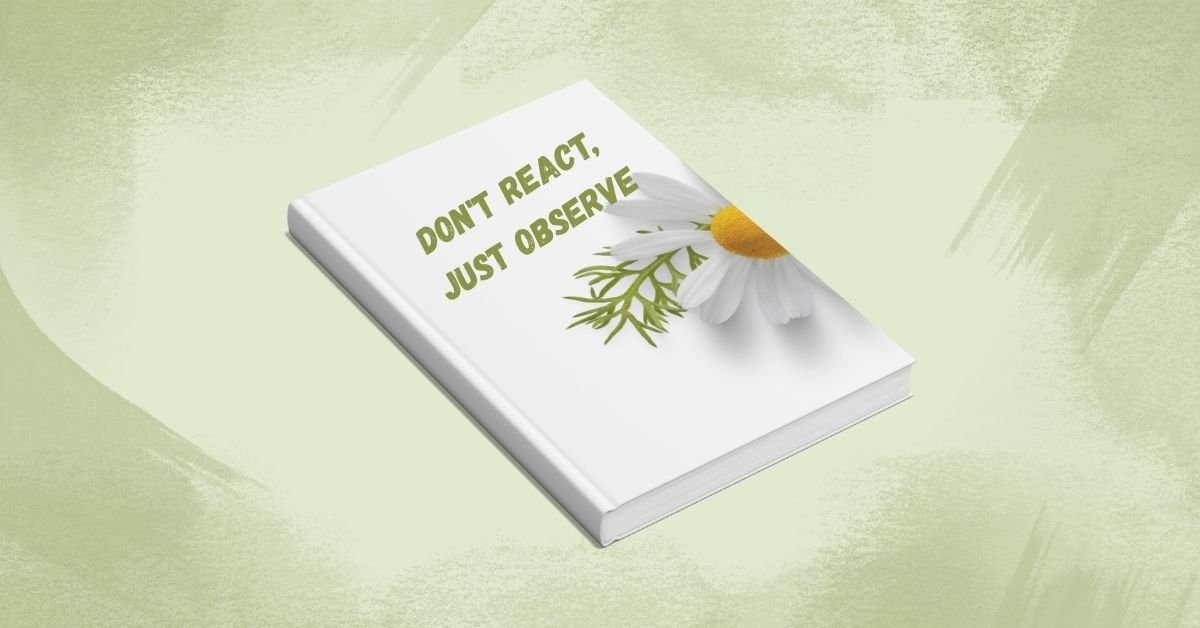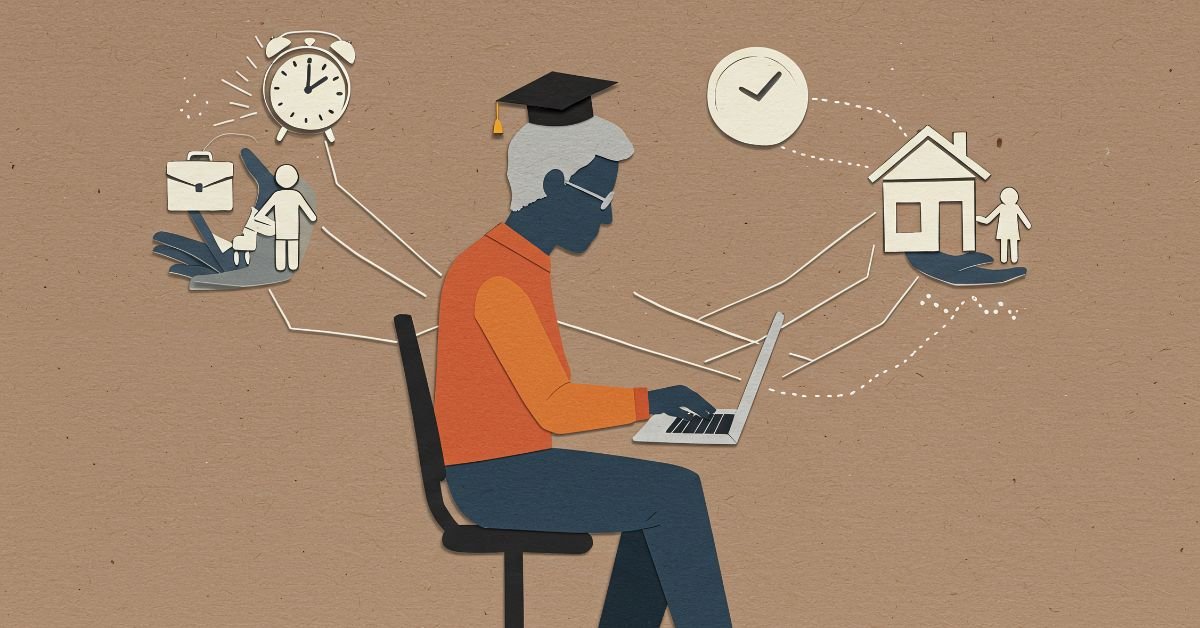Table Of Contents
Don’t React, Just Observe
Persistent distractions and external pressures often prompt impulsive reactions, which in turn contribute to increased stress and regret.
True power resides not in changing external circumstances, but in mastering one’s own responses.
This approach fosters both calmness and empowerment.
The central message of Don’t React, Just Observe is that enduring inner peace results from modifying personal responses rather than attempting to alter external conditions.
Many challenges arise not from external events themselves, but from impulsive reactions to those events.
Key Takeaway: By pausing to observe and responding intentionally, individuals can guide their emotions and relationships toward more favourable outcomes.
Drawing from insights from the book “Don’t React, Just Observe”, we will outline its ten key strategies.
Each technique elaborates on the central theme of prioritising observation over reaction, offering a unified set of practical tools.
These practical tools can be implemented immediately to facilitate a transition from chaos to clarity, thereby supporting the overall process outlined.
Whether facing daily irritations, workplace stressors, or interpersonal conflicts, adopting the principle of “observation over reaction” serves as a unifying strategy that can significantly impact various aspects of life.
Let us now move from these foundational concepts to the first practical strategy.
1. When The Urge To React Arises, Learn To Pause
Have you ever snapped at someone in anger, only to regret it moments later?
Reacting without forethought is our critical mistake, and it repeats endlessly unless checked.
The book emphasises that inside every person is a volcano of emotions, ready to erupt at the slightest provocation.
However, true strength lies in those who do not explode; they observe.
Imagine you are in a heated argument, and something hurtful is said.
Your blood boils, and you want to fire back.
Instead, pause for a few seconds.
Take A Deep Breath And Ask: ‘What am I feeling? Is this reaction needed?’
You may realise the issue is not as big as it seemed.
Reacting drains your energy, clarity, and control.
Observing uses your energy for growth and gives you real control.
A Simple Example: If someone says, “You cannot do anything,” a reaction might be, “Watch me prove you wrong!”
However, Observation Leads To: “Why are they saying this? Maybe they are projecting their own fears.”
Takeaway: Observation brings calm, improves relationships and decision-making, and turns reactions into opportunities for growth.
Silence is mastery, not weakness. Harness it.
Like an archer, pause to observe, then respond wisely.
The one who observes understands and wins.
2. Keep Your Mind Calm, And The World Will Start To Change
When your mind is restless, everything feels wrong.
Familiar people and places become unbearable.
A calm mind sees those same things as beautiful.
This chapter teaches that to change your world, first calm your mind; it is not magic, but a daily practice.
We react daily to rude comments, social media, work stress, or attitude.
This causes inner turmoil.
A calm mind changes your perspective.
Begin with simple habits.
Try morning breathing exercises: no phone, no music, just focus on your breath and allow the mind to settle.
Gradually, your mind becomes an ally, not an enemy.
Great leaders never react in haste; they listen, analyse, and respond from unwavering calm.
Silence holds power, while noise reveals weakness.
Try This: Next time anger rises, pause and feel your heartbeat.
In seconds, the intensity fades.
Key takeaway: A truly calm mind eases stress, clarifies decisions, and supports lasting success.
If your mind is under control, no situation can break you.
Commit Daily: “Today, I refuse haste. I observe. I decide.”
3. Observe Yourself, Not Others
Our biggest problem?
We focus too much on others and too little on ourselves.
Social media shows others’ achievements, fueling comparison.
However, the truth is, you are not behind; you are just looking in the wrong direction.
Remember: The real journey is inward. Judging others distracts from your own self-mastery.
Self-observation, watching thoughts and reactions without judgment, brings peace.
Two Friends Start A Business: One mimics competitors and fails.
The other pursues relentless self-improvement and wins.
Ask: “Why am I angry? What is the root of my fear?” This self-awareness uncovers untapped power.
Problems often start in our perceptions, not others’ actions.
Takeaway: Consistent self-observation leads to emotional control and mastery over your actions.
Comparison breeds jealousy; observation leads to growth.
Make It A Habit: Spend minutes daily reflecting on your thoughts.
Master your mind and base decisions on your truth, not others’ influence.
4. Choose Silence Before Reaction
Daily Life Provokes Us: cut off, criticised, or interrupted.
True power lies in silence, not words.
Pausing before reacting elevates you.
When insulted, your mind screams to retort.
Hold back, breathe, and let anger cool.
Let your words reveal wisdom, never ego.
Great People Pause: ‘Is this necessary? Will it hurt or waste energy?’ If so, smile and stay silent; it is your shield.
A Story Illustrates: A monk helps a woman cross a river, defying a rule. His disciple questions it later.
The monk replies, “I left her at the river; you are still carrying her.”
Reactions weigh you down; observation frees your mind and lightens your load.
Takeaway: A brief pause before reacting can protect relationships and your peace of mind.
Silence is an art, mastered only by those who dominate themselves.
In debates, the first to calm down wins.
Embrace silence; it transforms your aura, drawing people to your peaceful energy.
5. Do Not Get Swept Away In Emotional Storms, Observe Them
Emotions are like an ocean inside us: anger, fear, jealousy, love, despair.
Emotions make us human, but unchecked, cause harm.
This chapter teaches: Do not drown in emotions; observe them.
The observer never sinks.
Fury makes everything seem against us, but with time, issues shrink. Emotions distort reality like fog.
When furious, the world feels hostile, yet hours later, the crisis shrinks. Emotion distorts reality, fog blurs the landscape.
They are energy, not bad, but reacting turns them into weakness.
If betrayed, anger is natural, but observe it: “I am feeling this, but I am not this.” Say, “Anger is visiting,” not “I am angry.”
Practice: When emotions surge, focus on your breath and body.
Key Takeaway: Observing emotions allows them to pass, preserving clarity and self-control.
Understand Their Roots: “Why this sadness?” Insight halves the pain.
This does not make you emotionless; it makes you aware, like a skilled sailor navigating storms.
Emotions are your compass; observe, do not chase.
Let them visit and go; your home stays orderly.
6. Do Not Try To Change Others, Change Yourself
Life’s Big Error: Trying to fix others.
“Why don’t they change?” This drains our peace.
You cannot change others, only your reactions. When you change yourself, your world changes.
Pushing others makes them defensive, ruining bonds.
Instead, Observe: “Do I need to change them, or my reaction?”
Change Your Perspective: If someone is rude, think, “They are in pain.”
Anger turns to compassion.
Like Traffic: Honk in rage, and your day sours; stay calm, and it is over quickly.
Takeaway: Your power lies in controlling your responses, not external circumstances.
Calm responses lead to the right words and timing, turning ordinary into extraordinary.
Relationships falter on expectations; start with self-change, listen, soften.
Identify triggers; their hold weakens.
Self-change inspires others without words.
Focus inward for freedom.
7. Keep Your Mind Calm, And Situations Will Transform
Challenges Are Constant: Bad behaviour, tough decisions, and pressures.
However, a calm mind makes hard paths easy; unrest makes easy ones hard.
In crises, panic leads to errors, calmness to solutions.
A calm mind observes, then responds with clarity and intention.
If mistreated, do not explode, breathe, or observe your inner stir.
Anger melts, wisdom emerges.
Act from inner peace. Calmness is action, not retreat.
Like The Ocean: storms rage above, depths stay still. Dive inward for solace.
Faced with criticism, calmly ask, “Is there truth here?” This approach contrasts sharply with a defensive reaction.
Practice: When upset, say “Observe it,” watch thoughts flow like clouds.
Key Takeaway: True strength is revealed by calm restraint under pressure, not by reaction.
It sharpens timing and impact.
Daily: Sit quietly, peering inward.
Be the observer, control situations; never let them control you.
8. Stop Taking Things Personally, People Speak About Themselves
Half our stress comes from taking things to heart: a comment stings, ignorance hurts, and missing praise diminishes.
People’s words reflect their experiences, not your worth or truth.
If called selfish, it is likely their past talking.
We react, defending, wasting energy.
Understand: It is their mirror. Love sees good; jealousy finds flaws.
Takeaway: Recognising others’ words as self-reflection safeguards your inner peace.
Cut loose from judgment.
People always judge; their opinions are powerless.
Smile at insults; show peace is yours.
This is not arrogance; listen, but only internalise what serves you.
Correcting others drains you; live your truth.
Everyone fights battles; actions are about them.
Take the key to your emotions; unlock your freedom by refusing to personalise.
Practice: Ask, “Is this about me or their view?” 90% of them.
Let words fortify you. Refuse to break.
9. Live In The Present, Let Go Of Past And Future
Life’s noise comes from past regrets or future worries.
Regret lives in the past; anxiety feeds on the future.
True peace is only found in the present moment.
Takeaway: Dwelling on the past causes anger, and worrying about the future causes anxiety; clarity arises from living in the present.
Focus Here: notice your breath, thoughts, and surroundings.
It is not ignoring plans, but preparing without unrest.
Old pains?
Observe without reaction, they teach.
Future fears? Prep now; fear fades in action.
Practice: When worried, ask, “Is this now?” If not, release.
Present living keeps you poised.
Mornings: Affirm, “Today, I will live here.”
No storm defeats the present-dweller.
10. Gain Freedom And True Peace Through Self Awareness
Summing it up: Reactions harm; calmness empowers.
Self-awareness, observing thoughts, emotions, and habits without judgment, brings freedom.
You are no longer automatic; responses are deliberate.
Unaffected by negativity, decisions improve.
It transforms relationships, work, and life.
Daily: Sit, observe inwardly.
Mind calms, clarity grows.
Inner freedom withstands external chaos.
Ready to observe, stay calm, live now?
This art makes life easier, happier, and controlled.
Conclusion
In conclusion, Don’t React, Just Observe is not just a book; it is a life-changing philosophy.
Start small, pause once Today.
Over time, you will notice less stress, better connections, and profound peace.
If this resonates, share your favorite tip in the comments.
What chapter hit home?
Let us observe our way to a better life!






